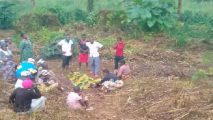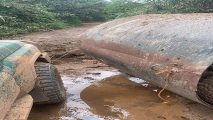Categories
Recent Posts
- Football: Panthère du Ndé Wins Cameroon Cup 2025
- Fifa brings in new £45 ticket for 2026 World Cup
- President Sisiku Ayuk Tabe, top aides to appear before the Supreme Court
- Pressure mounts on Biya as speculation grows over possible replacement of Ngute
- 2025 is the year when Biya’s long rule finally lost its last convincing justification
Archives
- December 2025
- November 2025
- October 2025
- September 2025
- August 2025
- July 2025
- June 2025
- May 2025
- April 2025
- March 2025
- February 2025
- January 2025
- December 2024
- November 2024
- October 2024
- September 2024
- August 2024
- July 2024
- June 2024
- May 2024
- April 2024
- March 2024
- February 2024
- January 2024
- December 2023
- November 2023
- October 2023
- September 2023
- August 2023
- July 2023
- June 2023
- May 2023
- April 2023
- March 2023
- February 2023
- January 2023
- December 2022
- November 2022
- October 2022
- September 2022
- August 2022
- July 2022
- June 2022
- May 2022
- April 2022
- March 2022
- February 2022
- January 2022
- December 2021
- November 2021
- October 2021
- September 2021
- August 2021
- July 2021
- June 2021
- May 2021
- April 2021
- March 2021
- February 2021
- January 2021
- December 2020
- November 2020
- October 2020
- September 2020
- August 2020
- July 2020
- June 2020
- May 2020
- April 2020
- March 2020
- February 2020
- January 2020
- December 2019
- November 2019
- October 2019
- September 2019
- August 2019
- July 2019
- June 2019
- May 2019
- April 2019
- March 2019
- February 2019
- January 2019
- December 2018
- November 2018
- October 2018
- September 2018
- August 2018
- July 2018
- June 2018
- May 2018
- April 2018
- March 2018
- February 2018
- January 2018
- December 2017
- November 2017
- October 2017
- September 2017
- August 2017
- July 2017
- June 2017
- May 2017
- April 2017
- March 2017
- February 2017
- January 2017
- December 2016
- November 2016
- October 2016
- September 2016
- August 2016
- July 2016
- June 2016
Featured
 2025 is the year when Biya’s long rule finally lost its last convincing justification
2025 is the year when Biya’s long rule finally lost its last convincing justification  Young Cameroonians: Build social capital to succeed
Young Cameroonians: Build social capital to succeed  Eulogy for HRH Nfor Professor Teddy Ako of Ossing
Eulogy for HRH Nfor Professor Teddy Ako of Ossing  Will Fr. Paul Verdzekov recognize the refurbished and rededicated Cathedral in Bamenda were he to return today?
Will Fr. Paul Verdzekov recognize the refurbished and rededicated Cathedral in Bamenda were he to return today?  Cameroon apparently under a de facto federalism
Cameroon apparently under a de facto federalism
Most Commented Posts
 4 Anglophone detainees killed in Yaounde
4 Anglophone detainees killed in Yaounde
18 comments Chantal Biya says she will return to Cameroon if General Ivo Yenwo, Martin Belinga Eboutou and Ferdinand Ngoh Ngoh are sacked
Chantal Biya says she will return to Cameroon if General Ivo Yenwo, Martin Belinga Eboutou and Ferdinand Ngoh Ngoh are sacked
13 comments The Anglophone Problem – When Facts don’t Lie
The Anglophone Problem – When Facts don’t Lie
12 comments Anglophone Nationalism: Barrister Eyambe says “hidden plans are at work”
Anglophone Nationalism: Barrister Eyambe says “hidden plans are at work”
12 comments Largest wave of arrest by BIR in Bamenda
Largest wave of arrest by BIR in Bamenda
10 comments
Latest Tweets
Featured
-

Football: Panthère du Ndé Wins Cameroon Cup 2025
-

Fifa brings in new £45 ticket for 2026 World Cup
-

President Sisiku Ayuk Tabe, top aides to appear before the Supreme Court
-

Pressure mounts on Biya as speculation grows over possible replacement of Ngute
-

2025 is the year when Biya’s long rule finally lost its last convincing justification
-

Armed Mbororo tribesmen killed 8 in Southern Cameroons’ new war
-

Southern Cameroons Crisis: Atanga Nji Boys abduct 8 people en route to Kumbo
© Cameroon Concord News 2025
20, July 2018
Southern Cameroons Crisis: Government can’t believe it! 0
When Cameroon’s long-serving dictator, Paul Biya, declared war on Southern Cameroonians in January 2018, little did he know that government casualties will become the next crisis he will be dealing with. His defense minister, Joseph Beti Assomo, had overtly declared that his troops would implement the president’s decision without batting an eyelid. A veiled threat that did not cut ice with Southern Cameroonian fighters who had secretly hatched a plan to get weapons that would leave the country’s military in grief for a long time.
Today, some 1,000 soldiers, police and gendarmes have been sent to an early grave by poorly trained Southern Cameroonian fighters who have shown great valor and determination to keep the country’s military in permanent fear. The government is yet to come out of its shock. But that is the truth. Those who have died will never come back. They died doing what they loved doing. Fighting for their country even when the ruler is a bloody dictator whose interest is to stay in power.
Currently, there is a bill at the country’s national assembly for the approval of some CFAF 600,000,000,000 for the compensation of families that have lost loved ones. This is a very guarded secret, but a source at the National Assembly that has elected anonymity has hinted Cameroon Concord News Group that this has become a hot potato, as those who sold the idea that a fast military action in the two English-speaking regions would produce the best results are clearly disappointed. Their so-called professionally trained military has not lived up to its billing.
There is fear within government circles that when Cameroonians will understand that they have lost so many soldiers, they would rise up against a government that has been working so hard to hide the truth. The government had felt that by killing a few Southern Cameroonians and by burning down some villages, Southern Cameroonians would be silenced forever.
Unfortunately, their best effort has been counter-productive. Southern Cameroonians have displayed a lot of bravado that has left the government in shock. Their unity of purpose has forced admiration on the docile Francophone population that thought the government’s action would only be second to Hitler’s blitzkrieg.
The government had clearly underestimated a lot of things. Southern Cameroonians are a very determined people and nothing short of a true and sincere resolution of this crisis that has been on the horizon for more than half a century will bring peace to Cameroon.
Cameroon has lost its charm. Its peaceful nation image has been shattered. Southern Cameroonians are still prepared to take on the government. The killing of their people and burning of their homes will not deter them.
Today, it is reported that more than three thousand Southern Cameroonians have been sent to an early grave by government militia and soldiers who have been working in close collaboration to decimate the English-speaking region’s population.
The number of atrocities and deaths has continued to rise as the government keeps on dilly dallying on the creation of the right conditions for the holding of the inclusive dialogue that the international community has called for.
According to Humans Rights Watch in its July 19, 2018, report published in New York, “Government security forces and armed separatists have committed grave abuses against residents of Cameroon’s Anglophone region, Human Rights Watch said in a report released today. The region has been rocked by protests and violent clashes rooted in long-standing political grievances by the country’s Anglophone minority.”
The report, based on research in the region, satellite imagery and video analyses and entitled, “These Killings Can Be Stopped’: Abuses by Government and Separatist Groups in Cameroon’s Anglophone Regions” found that both government forces and armed separatists have abused civilians in the western part of the country, displacing over 180,000 people since December 2017.”
“Anglophone separatists have extorted, kidnapped and killed civilians, and prevented children from going to school. In response to protests and violence by armed separatists, government forces have killed civilians, used excessive force against demonstrators, tortured and mistreated suspected separatists and detainees, and burned hundreds of homes in several villages,” the report also adds.
“The human rights situation in Cameroon has reached crisis level and could still get much worse,” said Mausi Segun, Africa director at Human Rights Watch. “International action is needed to ensure that both sides protect civilians and ensure justice for crimes against them.”
Human Rights Watch documented abuses by both government forces and a variety of separatist between late 2016 and May 2018. It interviewed 51 victims, relatives of victims, or witnesses of abuse, as well as 31 education and medical professionals, lawyers, and key international sources. The interviews were conducted in the northwest and southwest regions of Cameroon in April.
Southern Cameroonians have seen the worst and they strongly hold that if they do not stand up to the bully that the government is, they will never know their peace. They are determined to walk away from a poorly stitched marriage with a dishonest and ineffective Francophone government that has been robbing them of their natural resources.
Initially, Southern Cameroonian fighters depended on hit and run tactics, but after more than five months in the jungle, they now believe they can take on government troops that are properly equipped, but poorly trained. In the last week, they have been moving from one city to the next, chasing out faint-hearted government army soldiers who have already begun asking why the government is killing its own people.
Southern Cameroonian fighters have made their presence felt in the city of Buea which was considered by the government as impenetrable. Limbe, Southern Cameroon’s port city, was considered off limits to the fighters, but last week, they broke the myth and sent many residents running in different directions. Even soldiers and policemen had to flee for their dear lives. It is even reported that policemen and gendarmes are those who are helping to enforcement ghost towns declared by Southern Cameroonian fighters for fear of being targeted by the merciless fighters.
The pseudo-peace in Limbe has vanished. Southern Cameroonian fighters who were initially lurking in forests around the region have made up their minds to come to the cities and Limbe is now hosting lots of them. They are sick and tired of constant attacks from mosquitoes and poisonous reptiles who consider their presence in the jungle as an unfriendly intrusion into their private space and territory.
With an influx of people coming from other cities, it is obvious that Southern Cameroonian fighters have used the opportunity to establish a foothold in the city. Residents of the city are now respecting ghost town orders from the Southern Cameroons Interim Government that is widely considered as the legitimate authority in region to the letter.
The Southern Cameroons crisis stems from events in late 2016, when local lawyers and teachers mobilized over demands for respect of the region’s educational and judicial systems. This escalated into armed confrontations following heavy-handed repression by government security forces. The Cameroonian government negotiated with lawyers and teachers’ unions in early 2017, but its security forces continued to clamp down on Anglophone protesters, including the arrest of two prominent negotiators on January 17, 2017.
This caused the crisis to escalate. Calls for a federal system quickly turned into demands for secession. This rapidly metamorphosed into a full blown civil war, making the independence of the two English-speaking regions of Cameroon a certainty, especially as the government engaged in targeted killings.
Ever since the crisis, started, the country’s economy has taken many punches. State corporations located in Southern Cameroons have been significantly affected. Pamol, a palm oil production corporation located in Lobe, a small town in Ndian Division, has shut its doors as the fighting between Southern Cameroonian fighters and army soldiers takes a turn for the worse.
More than three thousand Pamol workers are today unemployed and living in permanent fear, as the fighting between the warring factions rages on. Schools and courts in the region have been closed for more than two years and it is increasingly obvious that the Yaoundé government has lost control of certain parts of the two English-speaking regions.
The Cameroon Development Corporation (CDC), one of the major employers in the region, is also going through a rough patch. Malende, a small town located some 6 km from Muyuka, has witnessed huge unemployment rates. The corporation’s rubber factory was set ablaze last week by some unidentified men and this has hit CDC like a ton of bricks.
In other plantations, many workers have simply deserted. The fighting is disrupting economic activities in those plantations and many workers hold that it is better to quit than to be caught up between the devil and the deep blue sea. The fighting, coupled with the derisory salaries the corporation pays to its workers, has made CDC unattractive and this is gradually eroding the government’s tax base.
Many of the fighters hold that it is time to target the country’s lone refinery located in the region’s port city of Limbe. They hold that they have never benefitted from it and they will have no remorse for burning it down to ashes.
In a taped message sent to the Cameroon Concord News Group’s Global Headquarters in the UK, the fighters say that is their target and they are prepared to bring Cameroon to its knees. They argue that their God-given wealth has never trickled down to them.
The last two years have really been challenging to the government, its revenue base has been eroded, as the national oil refinery located in the Southwest region is also facing really challenges. The crisis is a true nightmare to this once-upon-a-time oasis of peace. It is indeed a millstone around the neck of the government which is gradually collapsing under its weight.
While the government is putting on a brave face in public, it is indeed worried that Southern Cameroonians might walk away from the union that was stitched together in 1972 between West and East Cameroon. Southern Cameroonians hold that the union has been predicated upon lies right from the beginning and that a review of the system is long overdue.
Southern Cameroonians stress that much blood has already flowed and this makes it hard for the warring factions to sit around a negotiating table to narrow their differences. The killing of many Southern Cameroonians and the burning of their homes have left Southern Cameroonians with just the option of quitting their French-speaking counterparts.
Walking away from that ‘political marriage’ implies taking with them about 60% of the country’s wealth. Southern Cameroons is blessed with many resources, including oil, gas, diamond and timber. Its rich sub-soil has brought lots of economic benefits to the country. For almost 50 years, the Rio Del Rey estuary has been the source of more than 90% and at times 100% of all the country’s hydrocarbons, specifically oil.
In 2014, Cameroon exported US$5.88 billion worth of products, of which US$2.65 billion, about CFAF 1,650 billion, was from crude oil. This is a significant amount of money and no government can afford to stay on the sidelines and watch manna vanish into thin air.
But the government’s indifference to calls for an inclusive dialogue is giving secessionists more confidence and time to spread their gospel. The government’s military action has transformed it into a monster and this has pushed the civilian population into the arms of secessionists who are making hay while the sun shines.
However, with international pressure mounting on the government and the fear that the presidential election scheduled for October may be derailed, the government is gradually considering smoking the pipe of peace. But how possible is it to make peace in less than three months with all the blood that is all over the place?
Experts argue that the first step to such an effort is to ensure that the killings and burning of homes stop. They posit that this could be possible if the government grants a general amnesty and releases all Southern Cameroonians that are currently being held in jails across the nation. For the moment, everybody is holding their breath, hoping that the country’s president who has been indifferent to many calls for inclusive dialogue will finally see wisdom in the advice the world has given him.
By Kingsley Betek in Yaounde